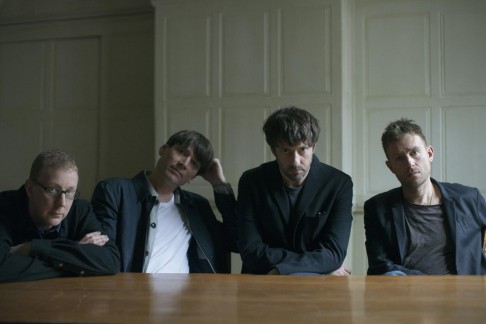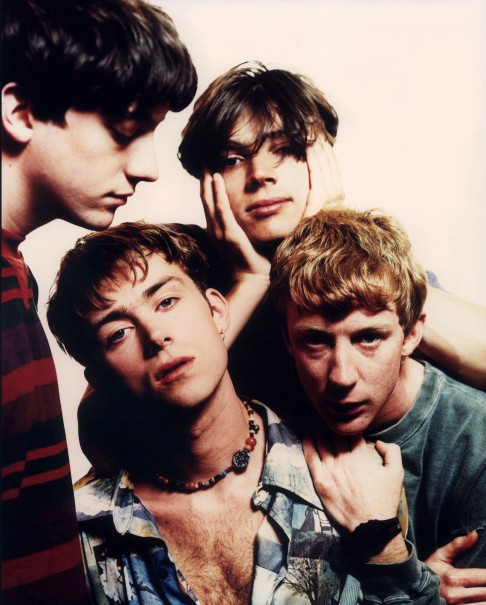
Friends reunited: Blur's Hong Kong album shows a band reconciled
While The Magic Whip doesn't contain anything obviously resembling a big hit, there are plenty of moments that sound comfortingly familiar
There are two kinds of band re-formation. The first is so straightforward that the "classic" bands that haven't done it seem weirdly anomalous. You bury your differences, a process eased by the passing of time, the sagacity that comes with age and, frequently, the promise of a whopping cheque.
If the past 10 years or so have told us anything about musicians, it's that few things are as effective at resolving those bitter, decade-long feuds over guitar overdubs or backstage catering arrangements or the drummer's taste in wives as the prospect of paying off the mortgage. Then you rehearse, book shows, and knock out the hits, knowing the crowd will be so overwhelmed by nostalgia they won't complain even if your singer sounds like a man who's clambered on stage at a karaoke night after six pints, wrested control of the microphone and started bellowing down it - The Stone Roses having apparently reunited specifically to prove this.
The second involves actually recording new material, and seems infinitely tricky, fraught with issues: not clumsily besmirching your legacy, making music that identifiably fits with your back catalogue without appearing to pastiche past glories. Indeed, it's proved tricky enough to bring reunions to an end: Kim Deal left the Pixies; The Stone Roses and Pulp clearly decided it wasn't worth the aggro, while Jerry Dammers recently noted his desire to record new songs was among the reasons he swiftly exited the reconstituted Specials.

So you can't really blame the reformed Blur for stepping rather gingerly around the issue of adding a new album to an oeuvre, which, if anything, feels more highly respected now than it did at the height of their success: once drowned out by the distracting sideshow of their "war" with Oasis, the subtlety and breadth of the music they made in the 1990s is easier to appreciate.
Since reforming to rapturous response six years ago, Blur were reported to have made three attempts to record a new album, but released only three songs: in 2010 and and two years later.
Until recently, singer Damon Albarn insisted the most recent sessions, in Hong Kong in 2013, had been a failure. No wonder many of the journalists present at the press conference to announce - a new album carved out of the Hong Kong recordings late last year by guitarist Graham Coxon and producer Stephen Street, with Albarn subsequently adding lyrics and vocals - thought the singer looked a bit surprised to be there.

It's certainly an odd way to make a comeback album. But perhaps its peculiar genesis - born out of jam sessions, moulded into shape by Blur's other protagonist - is what prevents from suffering the fate of 2002's largely Coxonless : an album that had plenty of great songs but felt like an Albarn solo project struggling to pass itself off as a band effort.
While doesn't contain anything obviously resembling a big hit - a fact Blur seem to have addressed by heralding the album's release with the most tune-free thing on it, the feedback-and-amplifier-hum-drenched - there are plenty of moments that sound comfortingly familiar.
could have hailed from the sessions for , the zippy would comfortably slot into the tracklisting of , opener does a lot of things Blur were famous for when Adidas Gazelles were compulsory footwear for young men with guitars. It variously drops its aitches, mentions commuters on "the 5:14 to East Grinstead", pays homage to Syd Barrett - there's a hint of Pink Floyd's legendary unreleased 1967 single about Coxon's vocal interjections - and has a go at consumer culture "mass produced in somewhere hot".
For music apparently jammed together during a few days' downtime on tour, The Magic Whip is abundant in beautiful songs
This is all good fun, but really comes into its own, in every sense, when it sounds least like music Blur fans will already own, when it most fits Coxon's description of its contents as "sci-fi folk". There's a popular belief that one of the reasons Blur split up was that the band were incapable of containing Albarn's increasingly eclectic musical interests, but frequently suggests otherwise, finding a fascinating common ground between his and Coxon's apparently divergent solo careers.
finds the restlessly peripatetic singer boggling with horrified fascination at the North Korean capital over a weird, unsettling musical backdrop of tinny drum machine beats, vocal samples and organ; Coxon's guitar sounds ghostly, it shivers and trembles, perfectly matching the lyric's alienation. matches Eastern-sounding strings to twanging, reverb-heavy guitar, while , the kind of delicate Bert Jansch-inspired fingerpicked guitar found on Coxon's 2009 album , rubs up against electronic noises and rhythms created on Albarn's iPad, as they were on Gorillaz's last album, .
Moreover, for music apparently jammed together during a few days' downtime on tour, is abundant in beautiful songs. Hazily lovely melodies wind through , and the peculiar stew of military drums, high-drama strings and vocodered vocals that makes up . - more alienated boggling at foreign landscapes - is the kind of gorgeous, careworn ballad that's quietly become Albarn's signature style over the course of his solo work, a relative of everything from on last year's to from his opera.
At least in part, seems to owe its existence to Albarn's dissatisfaction with as the band's final album-length statement: that sounded like the work of people at the end of their tether. "I'm here because I've got no f***ing choice … Can we stop now, please?"Albarn sang on the track . If does turn out to be Blur's final album, it's certainly a nicer way of ending things, with its touching images of older, wiser men happily reconciled with each other and their past.
There's a lovely moment on , when Albarn dolefully remembers himself escaping to Africa, "digging out my heart, in some distant sand dune". There's a pause, then he mumbles "in Hyde Park" - the scene of one of Blur's triumphant 2009 reunion shows - and the track suddenly lifts off in a burst of euphoric synthesizer and woozy guitar.
For all its lyrical tying-up of loose ends, it's hard not to hope that isn't Blur's last word. Musically, they don't sound like a band taking a final curtain call. They sound like a band filled with ideas and potential new directions, who have plenty left to do together, if they choose.
From Ong Ong
"I got on a boat on a hot sunny day
To get out of this town
Cause the tarmac was melting and the people seemed to sway
Stuck in the underground
To the isle of the black kites and the wishing tree
I wanna be with you
On the slow boat to Lantau through misty seas
I wanna be with you”
From Thought I was a Spaceman
"By the empty harbour
Where the junk boat phantoms float
The fight for Happy Valley,
Sadly the line broke."
From There Are Too Many of Us
“There are too many of us
In tiny houses, here and there
All looking through the windows
On everything we share”
From Ghost Ship
"I remember flashbacks lighting up magic waves
Eight o'clock Kowloon emptiness, handle it."
Ghost Ship (2):
"Till I ever hold you out there again
Will you be mine?
Cause I'm on a ghost ship drowning my heart
in Hong Kong
It's the last ride boarding here tonight
Out in the bay."
From Mirrorball
"Mirrorball on a Jordan train
I was under sea then up for air again
Ocean Park where the seagulls cry
I remember flying dragons too
I was there"
From New World Towers
“Green green the neon green
New world towers
Carved out of grey white skies”
From Lonesome Street
“What do you got?
Mass produced in somewhere hot
You'll have to go on the underground
To get things done here”
From I Broadcast
"I love the aspects of another city
The representatives are alright
In circulation the snake and the tiger
Waking up and shaving in industrial life"
